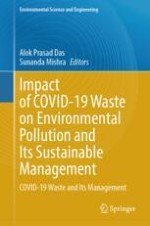2024 | OriginalPaper | Buchkapitel
17. The Large-Scale Recalcitrant Hospital Waste Generation During COVID-19 Pandemic: Environmental Impacts and Sustainable Remediation Approaches
verfasst von : Smrutipragnya Samal, Santosh Kumar Swain, Debasmita Dubey
Erschienen in: Impact of COVID-19 Waste on Environmental Pollution and Its Sustainable Management
Verlag: Springer Nature Switzerland
Aktivieren Sie unsere intelligente Suche, um passende Fachinhalte oder Patente zu finden.
Wählen Sie Textabschnitte aus um mit Künstlicher Intelligenz passenden Patente zu finden. powered by
Markieren Sie Textabschnitte, um KI-gestützt weitere passende Inhalte zu finden. powered by
